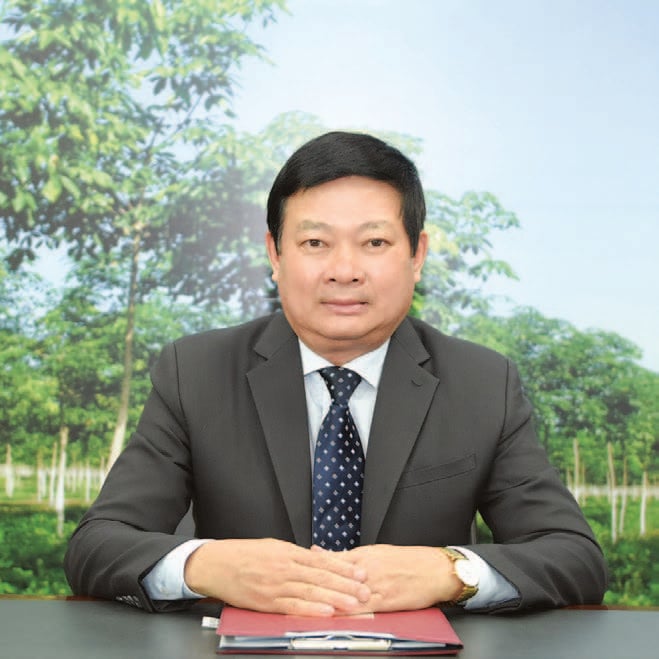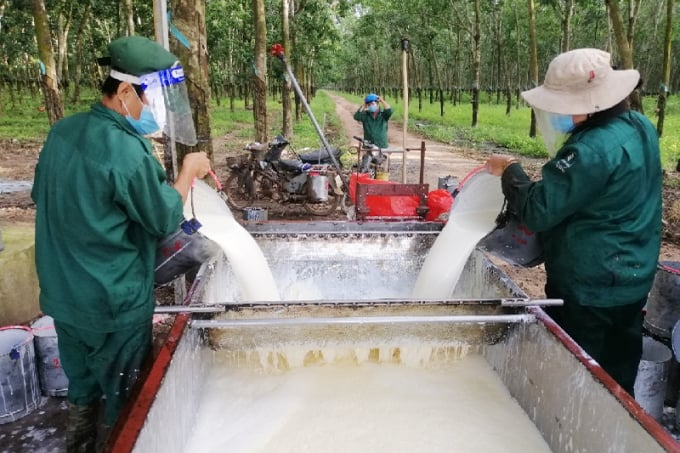November 27, 2025 | 20:53 GMT +7
November 27, 2025 | 20:53 GMT +7
Hotline: 0913.378.918
November 27, 2025 | 20:53 GMT +7
Hotline: 0913.378.918

Huynh Van Bao, General Director of Vietnam Rubber Group. Photo: Thanh Son.
Huynh Van Bao, General Director of Vietnam Rubber Group (VRG) said Vietnam exported 1.107 million tons of rubber valued at over US$1.8 billion in the first eight months of 2021,up 22.1% in volume and up 60% in value compared with the same period in 2020. Average price rose by 30% over the same period last year. China remained the largest market accounting for 70.3% of Vietnam's total rubber export value.
For VRG in particular, by the end of August 2021 the corporation's rubber consumption reached nearly 54% of the plan set for the whole year.
In recent months, the Covid-19 outbreak has made great impact on rubber production and consumption. The pandemic has significantly affected the global natural rubber supply chain. Fear of Covid-19 and restrictions hampered the travel, leading to a fall in demand for new vehicles resulting in a sharp decrease in car tire use.
In addition skyrocketing sea freights, container shortage and delay in goods delivery have contributed to falling prices of natural rubber in August and September, signed contracts couldn't be completed as scheduled.
Moreover, the prices were affected by other factors such as the changes in rubber supply and demand, the fluctuation of oil prices, the strength of US dollar and geopolitical factors. These elements have put severe pressure on the rubber industry as the pandemic continues.
Amid the Covid-19 outbreak in the Southeast of Vietnam, Cambodia and Laos, what plan did VRG plan to resume operations and to maintain the output as well as to boost exports in the last months of the year?
The Covid-19 outbreak has actually impacted on the rubber industry since the beginning of 2020. With the spirit of taking initiatives to overcome difficulties and organizing production amid the pandemic, from the start of 2021 VRG proactively designed scenarios for different levels of the Covid-19 outbreak , considering the impacts on each region in including the Southeast, Central Highlands, Central Coast, Northern mountainous region, Cambodia and Laos.
Thereby we took measures to organize production properly to both adapt to the specific climate and social-economic conditions and strictly comply with the Government’s Directives on the pandemic prevention and control.
To recover from Covid-19 after months of social distancing, VRG’s member companies proactively designed recovery plans in harmony with the re-opening plan of each locality.

Latex tapping at the plantation owned by Tay Ninh Rubber Joint Stock Company, a member of VRG. Photo: Thanh Son.
Accordingly the group’s member units reviewed and re-evaluated their existing resources including the capacity of the plantations, labor and capital resources) in comparisons with the target for the year 2021. Then, we based on that to develop a recovery plan in the new normal, taking synchronous measures in terms of technical solutions, production organization, labor management, disease prevention (vaccine +5k). Along with that, we regularly encouraged and rewarded workers to boost tapping capacity, making up for shortfall in output. Thanks to these measures we are likely to exceed the plan in terms of output and revenues.
The Covid-19 outbreak has affected the production and business activities of VRG. So, can VRG achieve the target for this year ?
From now until the year end, the pandemic will continue to be complicated but we will try our best to achieve the highest output, exceeding 3% over the plan set by the Commission for the Management of State Capital at Enterprises. We will also draw lessons to learn and to reach more positive results for the year 2022.
VRG planned to produce and buy about 450,000 tons of rubber. So far we have still kept track of our progress on producing and buying and we will reach the target set for this year.
VRG signed long-term contracts for nearly 50% of the consumption plan for 2021. Our member units have been following VRG’s strategy which is basing on market demand to produce. To implement that policy VRG has tracked the development of the rubber market, conducting analysis and price forecasting to adjust the Group’s floor price policy to make it closer and in line with the market. It would be easier for consumption.
Besides, we also paid much attention to trade promotion. Many measures were taken to help our member companies sell their products. Up to now VRG’s inventory has been keep at a reasonable level to both ensures delivery for the long-term contracts and not put pressure on sales for the last months of the year.
VRG proactively took stock of the situation, focusing on directing to solve the problems in general and help our member units to handle their own issues.
The strategic tasks such as improving the quality of products, building VRG brand and carrying out the sustainable forest development program continues play an important part in our operations. We have made impressive progress, building trust with customers and affirming VRG’s position in the market both domestic and international.
With scenarios mentioned above along with subjective advantages, VRG will achieve the rubber production and consumption target for the year 2021.
Thank you!
Bảo vệ sức khỏe người lao động là nhiệm vụ hàng đầu
Protecting employees’ health is top priority
With the operations taking place in many areas affected severely by Covid-19, VRG considered protecting employees’ health as a top priority in its recovery plan.
According to VRG, the Group’s member units reported 524 Covid-19 cases of which 368 patients were recovered and finished medical quarantine and were back to work. The total number of F1 cases reported was 1,824 of which 1,474 cases finished medical quarantine and got back to work.
To protect employees’ health VRG and its member units have promoted vaccination program for the workers. By October 12, 60,088 out of 76,527 employees of the Group got Covid-19 vaccines (reaching 78.5%) including 31,115 fully vaccinated persons (reaching 40.7%). Many member units of VRG reached 100% vaccination.
Besides, VRG and its member units also paid attention and took care of workers affected by Covid-19. VRG's Labour union spent VND11.7 billion to help 10,988 employees during the pandemic. The Group allocated VND10.13 billion for the implementation of "three-on-spot" measures.
VRG's Steering Committee for Covid-19 Prevention and Control will continue to implement "vaccination + 5K" message. The Group has asked its member units to persistently and resolutely implement the dual goals of preventing the COVID-19 and growth in which protecting employees' health is top priority.
Translated by Mai Tham
/2025/11/27/3830-1-152901_403.jpg)
(VAN) Dong Nai is developing its key crop areas, expanding planting area codes, and applying high technology to increase the value of agricultural products, aiming at a green and sustainable agriculture.

(VAN) Tay Ninh’s livestock sector is undergoing a major transformation, applying high-tech, closed-loop circular models to build sustainable value chains.
/2025/11/26/3627-4-082628_818.jpg)
(VAN) From a small café on the red basalt highlands, Le Van Hoang started a business with clean coffee, building Enjoi Coffee into a symbol of organic agriculture in the Lam Dong plateau.
/2025/11/25/0045-1-135246_13.jpg)
(VAN) Ca Mau is researching a model of sea-encroaching embankments combined with viaducts and logistics service zones, aiming both to prevent erosion and create land funds for marine economic development.

(VAN) The information was shared at the seminar 'Urban Agriculture - Solutions for Developing Green Spaces,' organized by the Kinh te & Do thi Newspaper and the Biotechnology Center of Ho Chi Minh City.
/2025/11/19/4141-2-132831_216.jpg)
(VAN) One of Japfa's outstanding solutions is implementing digital transformation and artificial intelligence (AI) to optimize operations, enhance productivity, and advance sustainable development.
/2025/11/19/4847-1-093540_448.jpg)
(VAN) The Gia Lai Provincial People’s Committee had a working session with the delegation of the U.S. Department of Agriculture, the State of Idaho, and representatives of the State's leading enterprises.